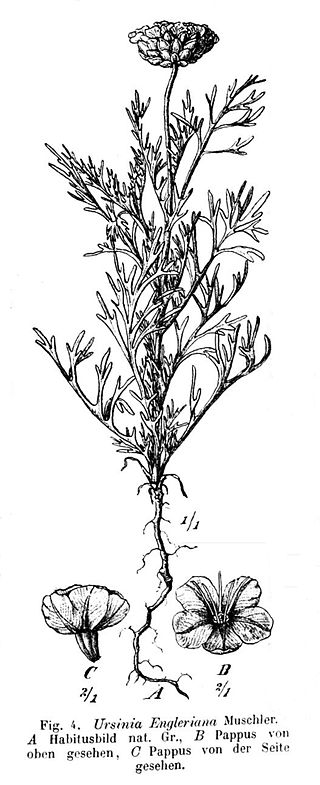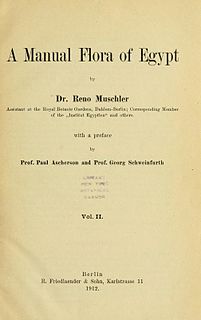
Abelia is a previously recognized genus that contained about 30 species and hybrids, placed in the honeysuckle family, Caprifoliaceae. Molecular phylogenetic studies showed that the genus was not monophyletic, and in 2013, Maarten Christenhusz proposed the merger of Abelia into Linnaea, along with some other genera. Abelia section Zabelia was raised to the genus Zabelia.

Georg August Schweinfurth was a Baltic German botanist and ethnologist who explored East Central Africa.
Dendrophorbium dielsii is a species of flowering plant in the family Asteraceae. It is found only in Ecuador. Its natural habitats are subtropical or tropical moist montane forests and subtropical or tropical high-altitude shrubland. It is threatened by habitat loss.
Miconia dielsii is a species of plant in the family Melastomataceae. It is endemic to Ecuador. Its natural habitat is subtropical or tropical moist montane forests.
Ruellia dielsii is a species of plant in the family Acanthaceae. It is endemic to Ecuador. Its natural habitat is subtropical or tropical moist montane forests.
Triclisia is a genus of flowering plants in the family Menispermaceae.

Stackhousia is a genus of annual and perennial plants in the family Celastraceae that are native to Australia, New Zealand, Malesia and Micronesia. The genus was first described by James Edward Smith in Transactions of the Linnean Society of London in 1798.

Eragrostis dielsii, commonly known as mallee lovegrass, is a species of grass in the family Poaceae that is endemic to Australia.
Setaria dielsii, commonly known as Diels' pigeon grass, is a species of grass in the family Poaceae native to Australia.
Mitrella is a genus of plants in the family Annonaceae.
Charles Schweinfurth was an American botanist and plant collector who distinguished himself by his studies on orchids. He predominantly collected species from Peru which he described in his four volume reference work Orchids of Peru (1958). He was a researcher at the Botanical Museum of Harvard University, and director of the Ames Orchid Herbarium where, in 1958, he was succeeded by Leslie Andrew Garay.

Ursinia nana DC. is a Southern African annual herb belonging to the Daisy family of Asteraceae. It is a pioneer plant of disturbed ground and usually grows to a height of only 30 cm. It flowers throughout the rainy season and, in mild weather with late rains, well into the autumn months. The leaves are deeply laciniate and bunched. In his 1912 contribution to Botanische Jahrbücher für Systematik, Pflanzengeschichte und Pflanzengeographie, the enigmatic German botanist Reinhold Conrad Muschler describes Ursinia engleriana, found near Okahandja in South West Africa, as a new species of African composite. Later this was considered to be the same as Ursinia nana described by de Candolle. Muschler praised the species as being extremely ornamental.

Reinhold Conrad Muschler aka Reno Muschler, was a German botanist, explorer and writer, who worked on the taxonomy of North African flora. He travelled extensively with Ernest Friedrich Gilg (1867–1933) and carried out a revision of the flora of Patagonia. His parents were both well-known singers at the Court Opera in Berlin.
Sphaerocodon is a genus of plants in the Apocynaceae first described as a genus in 1876. It is native to southern Africa.
- Sphaerocodon acutifoliumK.Schum. - Namibia
- Sphaerocodon angolensisS.Moore - Angola
- Sphaerocodon caffrum(Meisn.) Schltr. - Tanzania, Malawi, Zambia
- Sphaerocodon melananthum(K.Schum.) N.E.Br. - Zimbabwe
- Sphaerocodon natalenseBenth. - KwaZulu-Natal
- Sphaerocodon obtusifoliumBenth. - South Africa
- Sphaerocodon platypodumK.Schum. - Katanga in southern Zaire

Eucalyptus dielsii, commonly known as the cap-fruited mallee or cap-fruited mallet is a species of mallet that is endemic to the south-west of Western Australia. It has smooth bark, lance-shaped adult leaves, flower buds in groups of seven, yellow to yellowish green flowers and cylindrical to hemispherical fruit with a flange near the rim.
Stackhousia dielsii, commonly known as yellow stackhousia, is a species of plant in the family Celastraceae.
Siphonochilus aethiopicus is a species of plant in the ginger family, Zingiberaceae. It was first described by Georg August Schweinfurth and received its current name from Brian Laurence Burtt.

Daviesia dielsii, commonly known as Diels' daviesia, is a species of flowering plant in the family Fabaceae and is endemic to the south-west of Western Australia. It is on intricately-branched shrub with sharply-pointed, egg-shaped, vertically compressed phyllodes, and yellow and red flowers.
Lasiopetalum dielsii, is a species of flowering plant in the family Malvaceae and is endemic to the south-west of Western Australia. It is a spreading shrub with hairy stems, heart-shaped leaves and pink or white flowers.
Cryptandra dielsii is a flowering plant in the family Rhamnaceae and is endemic to the south-west of Western Australia. It is a spreading shrub with linear to narrowly oblong leaves and dense clusters of white, hairy, tube-shaped flowers.







